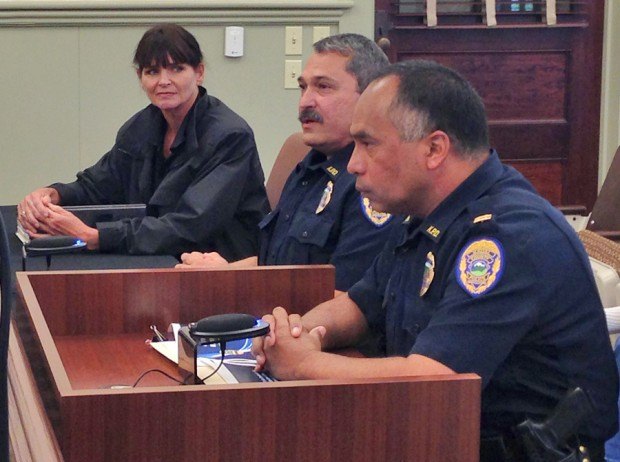LIHU‘E — After years of struggling with a large number of vacancies, the Kaua‘i P olice Department will close 2012 with only three open positions, according to KPD officers who briefed the Kaua‘i County Council last week. KPD’s 83rd class
LIHU‘E — After years of struggling with a large number of vacancies, the Kaua‘i P olice Department will close 2012 with only three open positions, according to KPD officers who briefed the Kaua‘i County Council last week.
KPD’s 83rd class will graduate 18 new police officers today, the second class to graduate this year. In May, 10 officers graduated from the 82nd class.
“In the past, it took up to 21⁄2 to 3 years to fully process an application from the time of the written test to the time of hire,” KPD Acting Assistant Chief Kaleo Perez said. “With recent modifications, that time has been cut to six to eight months.”
One of the main reasons for a drastic reduction in processing new police officers is the current “excellent” background investigators that KPD is using, according to Perez.
There were also other changes that have helped expedite the process. A notification for the physical readiness standard test is given online, saving eight to 10 weeks, he said. The written, physical and pre-employment psychological tests are all given within a two-day period, saving at least another 10 weeks.
As 2014 rolls in, another class will start, with more than 200 applicants having applied for the written test, according to KPD Lt. Robert Gausepohl. The new hires will help fill up positions needed for the upcoming expansion of a beat on the Eastside.
Gausepohl said that since 1989 there hasn’t been a new beat on the island.
“We’ve had applicants that were born before the last beat was established on Kaua‘i,” he said.
Gausepohl said the rise in applications is somewhat connected with the bad economy. Perez agreed, but said there is also a heightened interest in police jobs statewide.
Also, it’s a “great deal” to apply for a police job on Kaua‘i, said Gausepohl, explaining that most counties on the Mainland require certification or post-certification, which is not the case on the Garden Isle.
Despite the promising news for KPD, Kaua‘i is still below national standards when it comes to the ratio of police officers to the population.
KPD Chief Darryl Perry said the national standards released by the U.S. Department of Justice are, at a low ratio, 2.21 police officers per 1,000 people. The high ratio is 2.34 police officers per 1,000 people, and the average is 2.3 police officers per 1,000 people.
Including military personnel and visitors, Kaua‘i’s actual population is about 80,000 people, according to Perry. With KPD’s 150 authorized positions, including the chief and deputy chief, Kaua‘i’s ratio at maximum strength would be 1.88 police officers per 1,000 people.
This means that at maximum strength, KPD would still be short 27 officers if the low ratio of the national standards were to be considered. If the high ratio were to be applied, KPD would be short 37 positions. If the nation’s average ratio were to be considered, the shortage would be 34 officers.
From applicant to police officer
Perez said there are three phases in KPD’s hiring process: recruitment, pre-offer testing/background checks, and conditional job offer/post-offer testing.
In the recruitment phase, the applicants apply online. Those who meet the minimum qualifications are invited to take a written test, and results are given on the same day.
In the pre-offer/background check phase, applicants take a physical readiness standard test, and they have at least eight weeks to prepare for it. Handbooks and instructional videos help the applicants to pass the test. Those who pass the physical test take a psychological test on the same day.
Also during this phase, the remaining applicants go through a thorough background check. This check includes an autobiography, references, education and military history, employment records, residences, applications with other law enforcement agencies, and traffic, criminal, civil, drug and financial checks.
In the last phase, conditional job offers are extended to successful applicants. This phase includes post-offer psychological tests, polygraph examinations, pre-employment physical examinations and a final selection made by the chief of police.
Those who go through the entire process are offered probationary employment.
At any point during the hiring and selection process, drug screening can be done at the discretion of KPD.
• Léo Azambuja, staff writer, can be reached at 245-3681 (ext. 252) or lazambuja@ thegardenisland.com.


